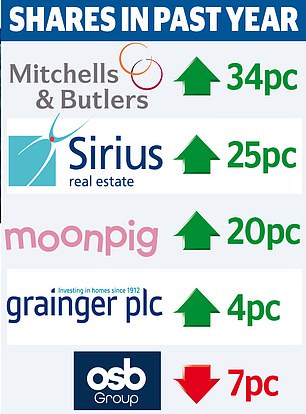FTSE 250 madness: Experts say these stocks could help Brits make money as UK markets rise
Suddenly the economic mood in Britain is brighter – cheerful even. After what one analyst called a “resounding recovery” in manufacturing in the first quarter, global banks have raised their expectations for the outlook.
Such is the growing optimism around the UK markets that investment professionals are hunting for bargains in the domestically focused FTSE 250.
This index is full of UK companies that ‘trade at significant discounts to their global peers’, as Simon Doherty, head of managed portfolio services at Quilter Cheviot, puts it.
The view that some of these companies are ripe for takeover is becoming increasingly popular – thanks to the battle over a £34 billion bid for mining giant Anglo American.
This seems to have emphasized the value of much cheaper, smaller companies – without political baggage.
He’s waving the flag: the FTSE 250 is full of UK companies ‘trading at material discounts to their global peers’
There are many of these opportunities, companies “hiding in plain sight,” according to Thomas Moore, manager of the Abrdn Equity Income Trust.
Stuart Clark, of Quilter Investors, highlights the FTSE 250’s rich mix of components. He says: ‘The index contains companies that have seen tougher times.
But they own large assets or intellectual property that would be attractive to larger competitors.
The index also includes smaller companies that are growing successfully and would be attractive to larger companies looking to accelerate their expansion.”

Enthusiasm for the FTSE 250 was further fueled by this month’s bid for engineering group John Wood. Lebanese suitor Sidara offered a 25% premium over John Wood’s share price. This approach was rejected, but Sidara can return with a more generous amount.
Last month, cybersecurity group Darktrace was acquired by Chicago private equity firm Thoma Bravo, in a deal seen as foreshadowing more FTSE 250 ‘acquisition activity’.
The expectation that more promising British PLC players will succumb to overseas predators is discouraging.
But not all FTSE 250 names will suffer this fate and here are the routes to making the most of what appears to be their brighter future.
Shares
Natalie Bell, manager of Liontrust’s UK Smaller Companies and UK Micro-Cap funds, highlights the two ‘niche champions’ of the FTSE 250: Moonpig, the online retailer of gift and greeting cards, and Rotork, maker of ‘flow control’ products. i.e. valves and actuators (components used in electrical and hydraulic processes).
She says: ‘Moonpig has a 65 to 70 percent share of the British and Dutch market.’ Founded in 2000, this company takes its name from founder Nick Jenkins’ hated nickname from his school days. Shares are up 16 per cent in the past year to 156p, but remain 63 per cent below levels three years ago. Analysts at Deutsche have set a target of 180p.
Bell likes Rotork’s solid growth level and strong profit margins. She adds: ‘The company is built on an ethos of continuous innovation, quality and reliability.’
Rotork shares are up 8% this year to 336p, with some analysts now targeting 430p. Alexandra Jackson, manager of the Rathbone UK Opportunities fund, names two of the potential winners in real estate.
“This sector should be at the forefront if rates are reduced this summer,” she says.
‘Sirius Real Estate owns industrial estates in Germany and Great Britain. The company is adept at transforming suboptimal and underutilized space, which is in high demand.
‘Sirius has now achieved rental growth of more than 5 percent for the tenth year in a row.’
Thanks to these features, the consensus of analysts rates Sirius Real Estate as a ‘buy’.
Grainger is Britain’s largest private landlord and the biggest name in build-to-rent projects. Jackson likes its low-risk business model, its balance sheet that can withstand a 50 percent drop in home prices, and its plan to double earnings per share by 2026. Once again, analysts rate Grainger as a buy.
Moore’s property choice is OneSavings Bank, Britain’s largest professional lender which is also benefiting from the country’s increased reliance on the private rental sector.
Funds
The easiest way to get broad exposure to the index is through a tracker fund such as the Vanguard FTSE 250 ETF (exchange traded fund).
But if you’re looking for a longer-term option, Quilter Cheviot’s Doherty points to the Janus Henderson UK Smaller Companies fund.
He says: ‘This fund invests in companies such as Bellway, the house builder, and Mitchells & Butlers, the pub operator. These companies should do well as Britain emerges from recession, interest rates are cut – and consumer confidence returns after the cost of living crisis.”
Let us hope for such an outcome.
Some links in this article may be affiliate links. If you click on it, we may earn a small commission. That helps us fund This Is Money and keep it free to use. We do not write articles to promote products. We do not allow a commercial relationship to compromise our editorial independence.
